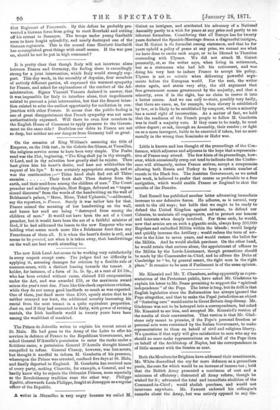A writer in Macmillan is very angry because we called
M. Guizot an intriguer, and attributed his advocacy of a National Assembly partly to a wish for peace at any price and partly to am inherent formalism. Considering that all Europe has for twenty years declared the Spanish-Marriage drama a disgraceful intrigue,. that M. Guizot is the formalist among statesmen, and that he for- years upheld a policy of peace at any price, we cannot see what- we have done to excite such anger, or to be likened to Thersitea contending with Ulysses. We did not attack M. Guizot. personally, or, as the writer says, when living in retirement,. but as a statesman who had left his retirement, and was- doing his very best to induce France to accept his policy. Ulysses is not en retraite when delivering powerful argu- ments before the European world. For the rest, the writer- states again, and states very ably, the old argument that free government means government by the majority, and that a minority, even if in the right, has no claim to coerce it into a better course. And we can onli re-state, possibly very badly, that there are cases, as, for example, when slavery is established. by law, or is likely to be established by conquest, where a minority has a moral right of insurrection. As a matter of fact, we hold' that the readiness of the French people to follow M. Gambetta was in itself a majority vote. If they cease to be ready, he must either depart ; or ask, through an Assembly, their resolve ; or fight on as a mere insurgent, liable to be executed if taken, but no more morally in the wrong than Kosciusko or Hofer was.


































 Previous page
Previous page